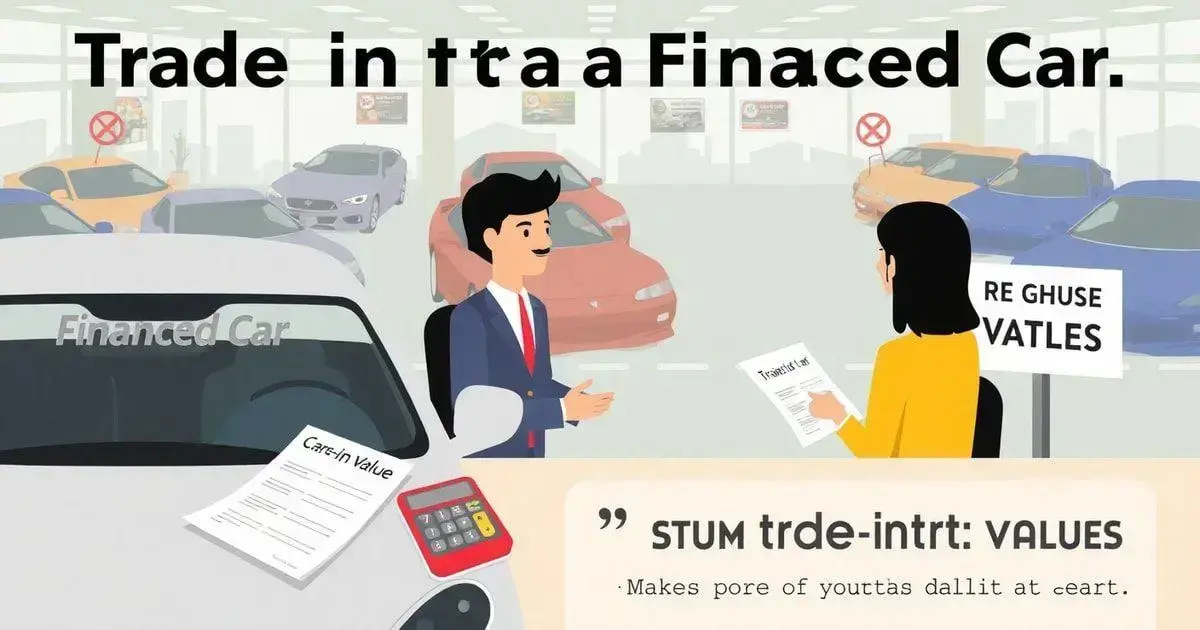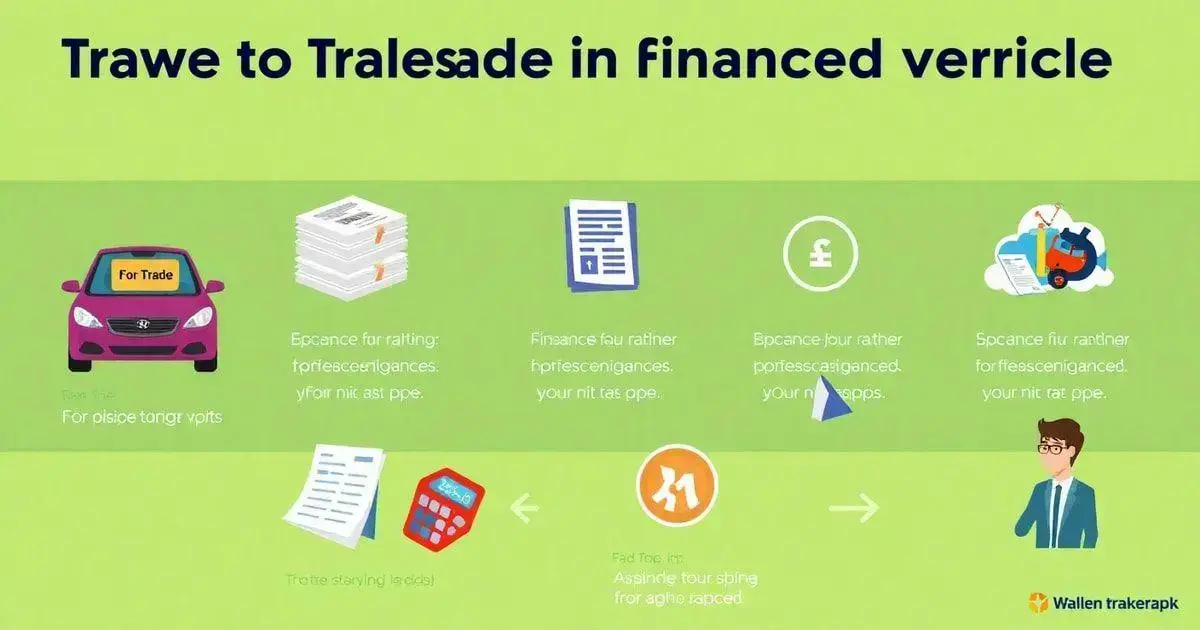Can I trade in financed car? When it comes to trading in a vehicle, many car owners wonder about the process, especially if they’re still paying off their loan. It’s important to understand how your current loan balance and the car’s value will affect the trade-in process.
Factors such as your car’s condition, mileage, and market demand can play a significant role in the trade-in value. Knowing your car’s worth beforehand helps you approach the trade-in process with confidence.
Before moving forward, it’s crucial to consider all the steps involved. Keep reading to learn more about how to handle trading in a financed car effectively.
Understanding Car Financing
Understanding car financing is essential for anyone looking to purchase a vehicle. When you finance a car, you’re essentially taking out a loan to pay for the vehicle’s cost. This means you’ll make monthly payments over a set term until the loan is paid off.
Interest rates, loan duration, and down payments are key components that affect your overall payment. A lower interest rate can save you money over time, while a larger down payment can reduce your loan balance.
If you’re considering trading in your car, can I trade in financed car? It’s crucial to understand how this may impact your loan and potential new vehicle purchase.
It’s also important to consider the total cost of the loan, not just the monthly payments. Many people fall into the trap of focusing solely on their budget for monthly payments, but this can lead to financial strain if the total cost is not manageable.
If you’re wondering, can I trade in financed car before the loan is paid off, it’s important to evaluate your loan balance and the car’s current value to ensure it’s the right choice for you.
Can You Trade in a Financed Car?

If you’re asking, can I trade in financed car? The answer is yes, but there are important factors to consider. First, the amount you owe on your current loan compared to the car’s market value plays a significant role. If your car is worth more than what you owe, you can use the equity for a down payment on your next vehicle.
However, if you owe more than your car’s worth, this is known as being ‘underwater’ on your loan. You might have to cover the difference when trading in the vehicle. This could mean rolling the negative equity into your new loan, which could result in higher monthly payments.
Another factor is the financing institution. Some lenders allow trade-ins while others may have restrictions. It’s advisable to reach out to your lender to understand any potential implications of trading in financed car and how it will affect your next steps.
Factors Influencing Trade-In Value
Several factors can influence the trade-in value of your vehicle. The first is the vehicle’s age; newer cars generally have a higher resale value.
Additionally, the make and model play a significant role in determining value. Certain brands are known for their reliability and retain value better than others.
Another important factor is the condition of the car. A well-maintained vehicle with low mileage will likely fetch more than one that is worn or has high mileage.
Regular maintenance records can boost the perceived value during a trade-in. If you’re wondering, can I trade in financed car, the condition can directly affect how much equity you may have available.
Market demand also affects trade-in value. If a particular type of car, like SUVs or trucks, is in high demand, your vehicle may have a higher trade-in value. However, during economic downturns, values may drop.
Lastly, the timing of your trade-in can impact the offer you receive. Specific seasons may see higher trade-in values due to demand; for instance, trading in a convertible during summer may yield better results than in winter.
Steps to Trade in a Financed Vehicle

Trading in a financed vehicle requires several important steps. First, assess your car’s current market value. You can use online valuation tools, such as Kelley Blue Book or Edmunds, to get an estimate of your car’s worth. Knowing this helps you understand what to expect during the trade-in process.
If you’re considering your options, can I trade in financed car is an important question to ask yourself early on.
Next, check your loan balance. Contact your lender to find out how much you still owe on your financing. This is crucial information because you need to know if you’re in the positive or negative equity position, which will influence your trade-in options.
Once you have this information, prepare your car for the trade-in. This includes cleaning it inside and out, making any minor repairs, and gathering service records. A car in excellent condition often receives a better offer.
Then, visit several dealerships to get trade-in offers. Don’t settle for the first offer; shop around to ensure you receive the best value for your vehicle. It’s smart to negotiate based on the research you’ve done.
Finally, review the trade-in offer carefully. Make sure it reflects the evaluation and your car’s condition. Ensure that all financial aspects align with your remaining loan balance before finalizing the trade.
Tips for a Smooth Trade-In Process
To ensure a smooth trade-in process, start by doing your homework. Understanding your vehicle’s market value is critical. Use online resources, such as Kelley Blue Book, to get a fair estimate.
This will help you set realistic expectations when you visit dealerships. If you’re wondering, can I trade in financed car, knowing your vehicle’s worth is an essential first step.
Next, prepare your car for the trade-in. Clean the interior and exterior thoroughly. A well-maintained car makes a stronger impression and can lead to a better offer. Additionally, gather all service records and documentation to present to the dealer.
When visiting dealerships, consider taking quotes from multiple places. This increases your chances of getting a better deal. Be honest with the dealer about the condition of your vehicle; honesty fosters trust and may yield a better result.
Another tip is to negotiate. Don’t take the first offer, as there may be room for improvement. Be ready to walk away if you feel the offer isn’t acceptable. Lastly, timing can influence your trade-in; try to trade during peak demand periods.
Alternatives to Trading in Your Financed Car
If you are considering alternatives to trading in your financed car, there are a few options available. One popular choice is to sell the vehicle privately. This often yields a higher price than a dealership trade-in.
However, it may require more effort and time to find a buyer. If you’re asking yourself, can I trade in financed car, but are unsure of your options, selling privately might be worth exploring.
You could also consider refinancing your car loan. This option might lower your monthly payments and allow you to keep your car. If you are unhappy with your current financing terms, refinancing could improve your financial situation without needing to trade in your vehicle.
Another alternative is to keep the car for a longer duration. By continuing to make payments, you’ll eventually own the car outright, which can save you money in the long run. This also gives you the benefit of no car payments if you decide to keep it indefinitely.
Finally, consider demanding a car donation. Donating your car can provide a tax deduction while also supporting a charitable cause. This can be a rewarding option if you are looking to make a positive impact.
Can I Trade in Financed Car? Final Considerations
Trading in a financed car can be a challenging yet rewarding process. Understanding its value, preparing for the trade-in, and exploring various options can make the experience smoother. If you’re wondering, can I trade in financed car, it’s important to know your options before moving forward.
Whether you decide to trade in your vehicle, sell it privately, or keep it longer, it’s essential to make informed decisions that align with your financial goals.
Remember, conducting research, seeking multiple offers, and being aware of market conditions can significantly impact the trade-in outcome.
Explore all available alternatives to ensure you make the best choice possible for your situation.

